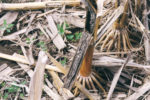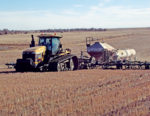Advertise Follow Us
Articles Tagged with ''potassium''
No-Till Notes
Strong soil structure, proper nutrient levels and adequate tiling hold the answer to improving drainage challenges in no-till fields.
Read More
A Biological Boost For Breaking Down Residue
Here’s a look at some of the products that could boost soil microbial activity and speed up decomposition of the toughest no-till residue.
Read More
No-Till, Residue Opens New Doors
In the heart of wheat country, continuous no-till delivers crop flexibility and productivity for Kansas grower Tom Pauly.
Read More
Finding The Right Fit With Fertility
To be more efficient with fertilizer, strip-tillers must be use caution in cutting rates and put nutrients where they do more good than harm.
Read More
No-Till Experts Share Their Best Ideas
NNTC speakers say cover crops, precision ag technology can help growers squeeze more profit out of every acre
Read More








